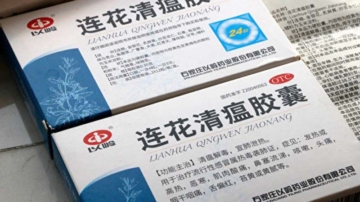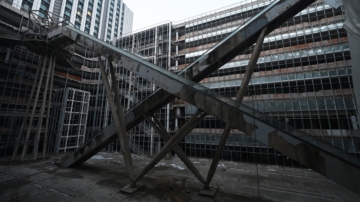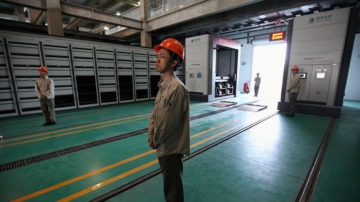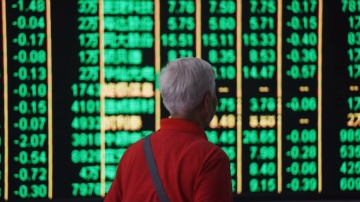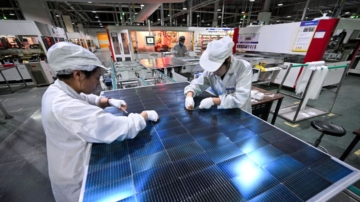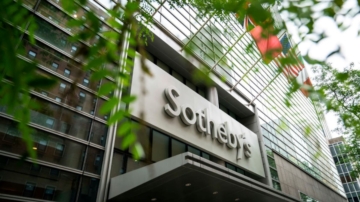【新唐人2012年7月25日訊】雖然中共政府一再表示「決不能讓房價反彈」,但根據中共國家統計局7月18號發佈的報告顯示,6月份中國70個大中城市中,新建商品住宅環比價格上漲的城市有25個,比上個月增加了19個,資料顯示,中國房價出現回漲的苗頭。然而,對比溫家寶在四川所說的「當前經濟還沒有形成穩定回升態勢,經濟困難可能還會持續一段時間。」購房者似乎不太支持這一點。
根據《彭博社》報導,隨著開發商推出新樓盤吸引購房者,北京的住宅項目6月份的銷售額激增了將近50%。
報導還說,中國市值最大的開發商「萬科集團」,6月份的合同銷售額為133億元,比5月份增加了24%。中國的女首富吳亞軍控制的「龍湖地產公司」,7月5號的公報顯示,6月份的銷售量比5月份增加了36%。
雖然中共總理溫家寶再次保證,繼續對房地產市場進行調控,但隨著地方政府放鬆某些購房限制,和中央銀行削減利率,房屋銷售量和價格都已出現反彈。
美國「南卡羅萊納大學」艾肯商學院教授謝田表示,中共當局實際不敢讓中國的房價垮下去,因為這將帶動國家的GDP數字,和整個國家的信貸、就業,以及通貨膨脹等問題。與此同時,中國的權貴集團也不希望抑制房價。
美「南卡羅萊納大學」教授謝田:「中國的房市裡邊,他最大的受益者或最大的既得利益者,是中共的權貴集團,這些人手中有大量的房子,對中國老百姓來說,這個價格已經漲的離譜,荒謬之高,中共政府從來沒有真正的,想把房價真正的壓下去,他也許是想制止房價上漲過快的勢頭,這樣就是緩解一下民意和民怨。」
日本《每日新聞》報導,中國由於經濟增速放緩,為了提升景氣,確保財源,不少地方政府私自放寬了對房地產市場的調控政策。另外,中國央行降息等緩和金融的政策也推動了許多城市的房價上揚,中國的房地產市場似乎有再起泡沫的危險。
謝田認為,中國樓市泡沫化已經出現,而經濟學家陳志飛也表示,中國樓市回暖僅僅是曇花一現。
經濟學家陳志飛:「這個房價現在看來,是中國宏觀經濟的一個縮影,這個新一輪的經濟回暖,主要還是中共在走投無路的情況下,繼續踩三駕馬車的最後一駕,就是投資,因為內需和外貿現在都是慘不忍睹,那麼從投資來看的話,督促國家銀行擴大貸款,使得樓市可能在某種程度上呈現曇花一現的景象。」
陳志飛表示,中國樓市前兩年上漲,很多都是熱錢炒作造成的,現在針對整個中國經濟的發展經營,熱錢已經紛紛撤資,這將造成樓市下衝的壓力。
經濟學家陳志飛:「我覺得這是中國經濟不可遏制的進入衰退的一個跡象,正如中國經濟的衰退,或者說中央政府的保八…不見得是能夠用行政指令來完成的,那麼中國樓市的下滑,也不見得是某個長官的意志能夠決定的。」
《彭博社》認為,經濟增長放緩考驗著溫家寶的承諾,他保證要一方面促進增長,一方面繼續對房地產市場進行調控。報導說,溫家寶7月7號在參觀江蘇省東部時表示,房地產調控處於一個「關鍵時期」,任務仍然很「艱鉅」。
採訪/陳漢 編輯/黃億美 後製/郭敬
Rising Housing Prices Test Wen Jia Bao's Promise
Although the Chinese government has repeatedly said,
"never let housing prices rebound,”
according to a report from the National Bureau of
Statistics released on July 18,
25 out of 70 medium and large-sized cities in China,
showed signs of price rebounding in the month of June.
That is an increase of 19 more cities since May.
However, this runs contrary to Wen Jiabao's statement
in Sichuan,
"The current economy has not formed a stable upward trend,
the economic difficulties may continue for some time."
Buyers do not seem to support this.
According to Bloomberg News reports, after developers
have launched new real estate to attract buyers,
residential sales in Beijing surged early 50% in June.
China's largest developer, "Vanke Group,” had 13.3 billion
yuan in contracted sales in June, an increase of 24 percent compared to May.
In June, “Longhu Real Estate Inc”, controlled by the richest
woman in China, Wu Yajun, showed an increase of 36% in sales volume since May.
Although the Chinese Prime Minister Wen Jiabao has pledged
repeatedly to continue to regulate the real estate market,
home sales and prices have rebounded due to local
governments' relaxation towards some of the purchase limits and the central bank cutting interest rates.
Xie Tian, Professor of Aiken Business School, University
of South Carolina stated that
the Chinese authorities are afraid of China's collapsing
housing prices,
because this will drive the entire country's GDP figures,
the entire country's credit, employment, and inflation problem.
At the same time, China's rich and powerful do not want
to curb housing prices.
Xie Tian: "In China's housing market, its biggest winners
and the biggest vested interest group are China's rich and powerful.
These people have a large amount of houses.
For other Chinese, the housing prices have gone up
to an outrageous, ridiculous level.
The Chinese regime has never tried to
suppress housing prices.
It might want to stop the soaring housing prices
just to ease public opinion and grievances."
Japan's Daily News reported that in order to improve
the economy and ensure financial resources in the midst of economic slowdown,
many local governments privately relax control
of real estate market policies.
In addition, China's central bank cutting interest rates
to ease financial policies also contributed to rising prices in many cities.
Thus, rising prices in the housing market seems to have
renewed the risk of housing bubbles.
Xie Tian believes that China's housing bubble has already
emerged, but the economist Chen Zhifei says that China's property rebound is short lived.
Chen Zhifei: “Looking at the prices now, it is a microcosm
of China's macro economy.
This new round of economic rebound is the Chinese regime's
last resort in desperate circumstances. That is, continuing to invest.
Because domestic demand and foreign trade are both terrible,
from the investment point of view,
promoting national banks to extend loans is to facilitate
a short-lived prosperity in the real estate market."
Chen Zhifei said that the rising property value two years
earlier was only due to hot money from speculation.
Now the hot money has been diversified and it has turned
into the pressure to drive down the housing prices.
Chen Zhifei: “I think this indicates China's economy
has entered into a recession.
Just like China's economic recession, the stability of
the central government cannot be maintained by administrative instructions alone.
By the same token, China's real estate market decline cannot
be decided by an executive's will."
Bloomberg News commented, “The economic growth
or slowdown is a test of Wen's commitment.”
He had pledged to promote growth and to continue
to regulate the real estate market.
Reports cite Wen Jiabao's comments during a visit
to the eastern Jiangsu Province on July 7,
that real estate regulation is in a "critical period",
and the task is still very "difficult."
根據《彭博社》報導,隨著開發商推出新樓盤吸引購房者,北京的住宅項目6月份的銷售額激增了將近50%。
報導還說,中國市值最大的開發商「萬科集團」,6月份的合同銷售額為133億元,比5月份增加了24%。中國的女首富吳亞軍控制的「龍湖地產公司」,7月5號的公報顯示,6月份的銷售量比5月份增加了36%。
雖然中共總理溫家寶再次保證,繼續對房地產市場進行調控,但隨著地方政府放鬆某些購房限制,和中央銀行削減利率,房屋銷售量和價格都已出現反彈。
美國「南卡羅萊納大學」艾肯商學院教授謝田表示,中共當局實際不敢讓中國的房價垮下去,因為這將帶動國家的GDP數字,和整個國家的信貸、就業,以及通貨膨脹等問題。與此同時,中國的權貴集團也不希望抑制房價。
美「南卡羅萊納大學」教授謝田:「中國的房市裡邊,他最大的受益者或最大的既得利益者,是中共的權貴集團,這些人手中有大量的房子,對中國老百姓來說,這個價格已經漲的離譜,荒謬之高,中共政府從來沒有真正的,想把房價真正的壓下去,他也許是想制止房價上漲過快的勢頭,這樣就是緩解一下民意和民怨。」
日本《每日新聞》報導,中國由於經濟增速放緩,為了提升景氣,確保財源,不少地方政府私自放寬了對房地產市場的調控政策。另外,中國央行降息等緩和金融的政策也推動了許多城市的房價上揚,中國的房地產市場似乎有再起泡沫的危險。
謝田認為,中國樓市泡沫化已經出現,而經濟學家陳志飛也表示,中國樓市回暖僅僅是曇花一現。
經濟學家陳志飛:「這個房價現在看來,是中國宏觀經濟的一個縮影,這個新一輪的經濟回暖,主要還是中共在走投無路的情況下,繼續踩三駕馬車的最後一駕,就是投資,因為內需和外貿現在都是慘不忍睹,那麼從投資來看的話,督促國家銀行擴大貸款,使得樓市可能在某種程度上呈現曇花一現的景象。」
陳志飛表示,中國樓市前兩年上漲,很多都是熱錢炒作造成的,現在針對整個中國經濟的發展經營,熱錢已經紛紛撤資,這將造成樓市下衝的壓力。
經濟學家陳志飛:「我覺得這是中國經濟不可遏制的進入衰退的一個跡象,正如中國經濟的衰退,或者說中央政府的保八…不見得是能夠用行政指令來完成的,那麼中國樓市的下滑,也不見得是某個長官的意志能夠決定的。」
《彭博社》認為,經濟增長放緩考驗著溫家寶的承諾,他保證要一方面促進增長,一方面繼續對房地產市場進行調控。報導說,溫家寶7月7號在參觀江蘇省東部時表示,房地產調控處於一個「關鍵時期」,任務仍然很「艱鉅」。
採訪/陳漢 編輯/黃億美 後製/郭敬
Rising Housing Prices Test Wen Jia Bao's Promise
Although the Chinese government has repeatedly said,
"never let housing prices rebound,”
according to a report from the National Bureau of
Statistics released on July 18,
25 out of 70 medium and large-sized cities in China,
showed signs of price rebounding in the month of June.
That is an increase of 19 more cities since May.
However, this runs contrary to Wen Jiabao's statement
in Sichuan,
"The current economy has not formed a stable upward trend,
the economic difficulties may continue for some time."
Buyers do not seem to support this.
According to Bloomberg News reports, after developers
have launched new real estate to attract buyers,
residential sales in Beijing surged early 50% in June.
China's largest developer, "Vanke Group,” had 13.3 billion
yuan in contracted sales in June, an increase of 24 percent compared to May.
In June, “Longhu Real Estate Inc”, controlled by the richest
woman in China, Wu Yajun, showed an increase of 36% in sales volume since May.
Although the Chinese Prime Minister Wen Jiabao has pledged
repeatedly to continue to regulate the real estate market,
home sales and prices have rebounded due to local
governments' relaxation towards some of the purchase limits and the central bank cutting interest rates.
Xie Tian, Professor of Aiken Business School, University
of South Carolina stated that
the Chinese authorities are afraid of China's collapsing
housing prices,
because this will drive the entire country's GDP figures,
the entire country's credit, employment, and inflation problem.
At the same time, China's rich and powerful do not want
to curb housing prices.
Xie Tian: "In China's housing market, its biggest winners
and the biggest vested interest group are China's rich and powerful.
These people have a large amount of houses.
For other Chinese, the housing prices have gone up
to an outrageous, ridiculous level.
The Chinese regime has never tried to
suppress housing prices.
It might want to stop the soaring housing prices
just to ease public opinion and grievances."
Japan's Daily News reported that in order to improve
the economy and ensure financial resources in the midst of economic slowdown,
many local governments privately relax control
of real estate market policies.
In addition, China's central bank cutting interest rates
to ease financial policies also contributed to rising prices in many cities.
Thus, rising prices in the housing market seems to have
renewed the risk of housing bubbles.
Xie Tian believes that China's housing bubble has already
emerged, but the economist Chen Zhifei says that China's property rebound is short lived.
Chen Zhifei: “Looking at the prices now, it is a microcosm
of China's macro economy.
This new round of economic rebound is the Chinese regime's
last resort in desperate circumstances. That is, continuing to invest.
Because domestic demand and foreign trade are both terrible,
from the investment point of view,
promoting national banks to extend loans is to facilitate
a short-lived prosperity in the real estate market."
Chen Zhifei said that the rising property value two years
earlier was only due to hot money from speculation.
Now the hot money has been diversified and it has turned
into the pressure to drive down the housing prices.
Chen Zhifei: “I think this indicates China's economy
has entered into a recession.
Just like China's economic recession, the stability of
the central government cannot be maintained by administrative instructions alone.
By the same token, China's real estate market decline cannot
be decided by an executive's will."
Bloomberg News commented, “The economic growth
or slowdown is a test of Wen's commitment.”
He had pledged to promote growth and to continue
to regulate the real estate market.
Reports cite Wen Jiabao's comments during a visit
to the eastern Jiangsu Province on July 7,
that real estate regulation is in a "critical period",
and the task is still very "difficult."

